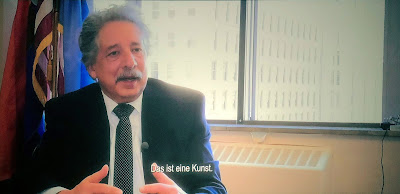The
Badische Zeitung, Freiburg's only local newspaper, frequently offers goodies to its subscribers (paper and electronic) in the form of excursions and theater shows. In November of last year, Red Baron was excited when he read about a vaudeville at the city's theater named Love Life with music by Kurt Weill and the book and lyrics by
Alan Jay Lerner.
Who does not remember Weill's
The Threepenny Opera with the
Moritat von Mackie Messer (Mack the Knife) and even more magnificent the
Rise and Fall of the City of Mahagonny, a critical look on modern civilization in a fictitious, prosperous town somewhere in the south of the States.
Kurt Weill, a Jew who fled from Nazi Germany to the States in 1933, had to earn his living in New York. So he composed the music for a couple of early musicals. Among them is
Love Life, which he and Lerner called a vaudeville rather than a musical. On Wikipedia, I read, "
Love Life opened at the 46th Street Theatre on Broadway in October 1948."
The plot is about an American couple, David and Susan Cooper, living through more than 150 years of U. S. history with the usual ups and downs in their relationship.
 |
They are just singing in the rain bed (©Theater Freiburg) |
Critics regard Love Life for its music as a precursor of later more successful Broadway musicals, e.g.,
Chicago.
Cabaret, or
A Chorus Line. Indeed, Weill experimented with many musical styles, although sometimes the music reminded me of
Anni, get your gun. Still, Kurt's genius shines through in the overtures. Lerner's Text and lyrics sounded simple to me, at least in their German translation.
Love Life ran on Broadway for only seven months with just 252 performances.
Why was
Love Life never revived? Why was it forgotten? Is the plot too socialist? The risk of unemployment during industrialization, the fight for female suffrage, and capitalist abuse are some of the topics clad in music. The performance in Freiburg does not end here. It brings back memories of
The Wizard of Oz,
Gone with the Wind,
Casablanca, and
My Fair Lady, sometimes challenging for a German audience to grasp. You meet
Alice in Wonderland, Snow White, Frankenstein, Charlie Chaplin, Doris Day, Marylin Monroe, and
Groucho Marx. Suddenly I found myself in the musical
Gigi, listening to the famous "I Remember it Well" lyrics that Lerner later reused in a revised form in the movie
Gigi of 1958.
 |
| ©Theater Freiburg |
The Freiburg performance in February 2018 received excellent reviews throughout Germany. The Theater group and orchestra surpassed themselves. Suddenly classical opera singers had to play and dance as well, and the orchestra met Weill's musical demands with a high degree of flexibility, virtuosity, and concentration.
 |
| ©Theater Freiburg |
Somehow the German revival of
Love Life in Freiburg pays tribute to Kurt Weill's father, Albert, who originated from nearby Kippenheim. He became Kantor of the Dessau Jewish community before he returned to Baden, serving at Eichstetten near the Kaiserstuhl. Undoubtedly Kurt inherited his musical talent from his father.
*

























